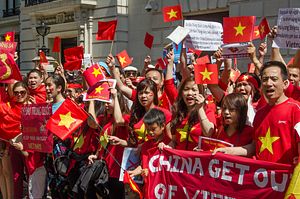First things first: Have a question about China’s foreign policy or domestic politics? Why not ask an expert! The Diplomat’s China Power bloggers will be doing an “Ask Us Anything” on Reddit on April 30. Check out the official announcement here. Drop by and get answers to all your burning questions about the South China Sea, China’s anti-corruption drive, and more.
And now, on to your regularly scheduled China links…
For anyone who finds themselves a bit adrift (pun intended) when it comes to the history of the various claims to the South China Sea, Chas Freeman has you covered. A former U.S. Ambassador and long-time China expert, Freeman outlined the various claims in a recent speech at Brown University. “Listen closely,” Freeman warns at the outset. “The facts belie the prevailing narratives.” I won’t attempt to summarize the tangled historical narratives here, but one quote is particularly relevant for the situation today:
But Malaysia, the Philippines, Vietnam, and now China have correctly understood that the key to sovereignty is not legal arguments but physical possession and control – a continuous human presence. Whether an island generates an EEZ or simply a twelve-mile territorial sea is determined by whether or not it is able naturally to support human life. Hence the rush to seize and settle any and all land features in the South China Sea and to demonstrate that people can live on them.
China, Freeman notes, was late to this game, which may explain why Beijing is now being particularly assertive at building up the few islands and reefs it does hold.
In others news, a Reuters exclusive may have finally answered the question of what state secrets former Politburo Standing Committee member Zhou Yongkang stands accused of leaking. According to Reuters’ sources, “China has charged former domestic security chief Zhou Yongkang with leaking state secrets because he warned political ally Bo Xilai in 2012 that Bo was about to be ousted.” That, sources said, could have given Bo a chance to flee abroad, or even seek asylum in a foreign embassy (as Bo’s former right-hand-man, Wang Lijun, did at a U.S. consulate in 2012). Reuters also reports that Zhou wanted Bo to succeed him as the head of domestic security affairs on the Politburo Standing Committee – a position that actually ended up being scrapped altogether with the slimming of the PBSC from nine to seven members.
Over at The Economist, we get a cautionary tale for all those China bears. The “ghost city” in Zhengzhou famously profiled on the U.S. news show “60 Minutes” is now a bustling metropolis. The Economist also notes, however, that Zhengzhou still symbolizes the hard truth about China’s economy: “The city’s GDP growth fell to 9.3 percent last year from an average of more than 13 percent over the preceding decade. The downward trend will continue.” Still, The Economist believes China is in for a soft landing as its growth inevitably slows: “China also has impressive underlying strengths and a new determination to fix its most harmful distortions.”
































